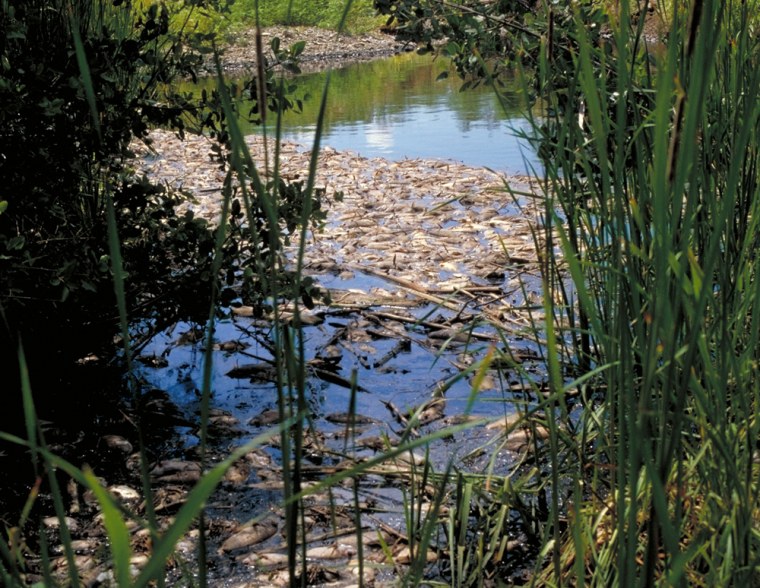Untreated sewage pouring into the world's seas and oceans is polluting their water and coastlines and endangering the health and welfare of the people and animals that inhabit them, according to a U.N. report released Wednesday.
As well as the growing problem of sewage, oceans also are suffering from rising levels of nutrients such as runoff from agricultural land triggering toxic algal blooms that deprive the water of oxygen, destruction of coastal ecosystems such as mangroves and a rising tide of ocean litter, says the U.N. Environment Program's State of the Marine Environment report.
"An estimated 80 percent of marine pollution originates from the land and this could rise significantly by 2050 if, as expected, coastal populations double in just over 40 years time and action to combat pollution is not accelerated," U.N. Environment Program chief Achim Steiner said.
Close to 40 percent of the world’s population live on the coastal fringe. In many developing countries, between 80 and nearly 90 percent of sewage entering the coastal zones is estimated to be raw and untreated, the report stated.
"We perhaps in the 20th century thought we could use the oceans as our sewage treatment plants," Steiner told reporters in The Hague. "This sewage is not just something that goes into the sea and the sea does it for us anymore."
There was some good news: oil pollution is falling and progress is being made on preventing radioactive materials, industrial chemicals and pesticides tainting the oceans, the report said.
The amount of oil entering the oceans has "decreased to 37 percent of 1985 levels," the report said, with spills from tanker accidents down 75 percent.
However the report, which pulled together data from governments and researchers around the world, warned that climate change and loss of ice is opening up Arctic regions to shipping and oil exploration raising the possibility of spills there and said that oil pollution was severe around ports in countries including Bangladesh, Indonesia, Malaysia, Nigeria and Pakistan.
Dead zones double
The report cited areas threatened by marine pollution include the North Sea’s ocean floor, coral reefs in South East Asia, wetlands in North America, Southern and Western Africa, mangroves in many Caribbean countries, Ecuador and Colombia, and fisheries in Latin America.
The report also noted increasing levels of pollutants from sources like agricultural fertilizer, manure, sewage and fossil fuel burning, with the problem spreading from developed to developing countries as well.
This has led to doubling of the number of oxygen deficient coastal “dead zones” every decade since 1960, and degradation of seagrass beds and emergence of toxic algal blooms.
Another problem for coasts and coral reefs is the varying amount of sediments reaching them because of developments like dams and deforestation.
"Some coastlines ... are shrinking because the soils are being trapped by barrages upstream," the report warned. "Others are suffering for precisely the opposite reason — artificially high amounts of sediments are now swilling down rivers choking sea grass beds, silting up coral reefs and clogging up other important habitats and coastal ecosystems."
Beijing meeting
The report will be presented to delegates at a conference in Beijing from Oct. 16-20 that will discuss progress in a 10-year-old action plan to tackle marine pollution and how to boost the effort to clean up oceans and seas in coming years.
It estimated that tackling the sewage problem alone will cost an extra $56 billion each year worldwide.
Paying for measures to clean up or prevent pollution remains a vexed issue.
"Usually the ones who are the source of pollution are not the ones who bear the brunt or the impact of pollution," Steiner said, citing the example of small fishing communities whose catches are devastated by algal blooms blamed on runoff from agriculture inland.
"Those who in a sense cause pollution are not being asked to bear the price of cleaning it up or indeed preventing it in the first place," he added.
Steiner said that dealing with one of the problems highlighted in the report — destruction of coastal ecosystems like wetlands — could let nature give humanity a helping hand in preventing pollution.
"In many countries we are losing nature's capacity to actually deal with some of the sewage and effluents because we are destroying the wetlands that could provide us — particularly coastal wetlands — with filtration capacity to avoid the kind of runoff into the sea," he said. "We also need to rediscover or demonstrate how maintaining wetlands ... can avoid heavy infrastructure investments because nature can cope with a certain degree of pollution, particularly if you use its natural mechanisms."
